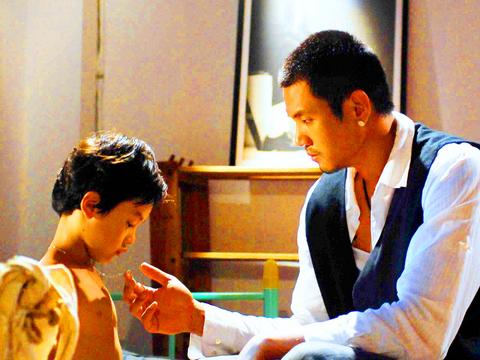There is nothing intrinsically vicious about a tearjerker movie, and going to the movies for a good cry has a long and distinguished tradition. I Wish (奇妙的旅程), the new celebrity vehicle featuring TV host Blackie (陳建州) and model Cheryl Yang (楊謹華) sets out to move its audience to tears, but unfortunately, instead of tugging at the heart strings, it launches into an assault on the tear ducts that flagrantly disregards all sense of good taste and common decency. It's an act of emotional battery that has all the subtlety of a blow to the head from a blunt instrument.
The plot is not without potential. Blackie (陳建州) plays Lee Bing, a gifted music student who has become a bitter and emotionally stunted grown-up who scraps a living singing in pubs. One day, he finds a child at his door who claims to be his son by his estranged wife Qi Li (Cheryl Yang, 楊謹華). The kid leads him on a journey of self-discovery that involves a deathbed wish (hence the title) and a little girl struggling with terminal leukemia. Without giving away the plot twist that wrings a few more tears from the audience, there are shades of Ghosts, Sixth Sense and the host of movies about innocent childhood redeeming the misdirected lives of grown-ups.
Blackie's narrow range of emotional expression (mostly he simply looks constipated) in a film that tries to show the nuances of suffering is the first strike against I Wish. Wang Cheng-wei (汪政緯), who has also come of age through TV variety shows, is cute as the child of the story, but heavy-handed cuteness wears down audiences' patience. Strike two. A deathbed scene with Yang leaning forward while wearing a low-cut V-neck was just the most heinous instance of director Hsu Guo-jhih's (徐國誌) lack of taste. Strike three. An intrusive musical score that felt the need to underline every emotional moment. Strike four. A Sunday-school theme of the wish-fulfilling properties of a Christian god was seriously annoying, and made the film, packed with a young generation of TV personalities, strangely dated and preachy. Strike five ... wait. You only get three strikes.

PHOTO: COURTESY OF JETTONE FILMS LIMITED
I Wish is a commendable effort of Taiwan's film industry to break out of the art house and establish a relationship with the mainstream movie-going public. Leveraging the appeal of well-known TV personalities, and linking with variety show Blackie's Teenage Club (我愛黑澀會) and the talent show One Million Star (超級星光大道), is a device of proven worth, distasteful as it may be. It is unfortunate that ham-fisted direction and workaday acting undermines any serious cinematic pretensions and the whole thing comes off rather like an extended public service advertisement for loving thy neighbor.

In the March 9 edition of the Taipei Times a piece by Ninon Godefroy ran with the headine “The quiet, gentle rhythm of Taiwan.” It started with the line “Taiwan is a small, humble place. There is no Eiffel Tower, no pyramids — no singular attraction that draws the world’s attention.” I laughed out loud at that. This was out of no disrespect for the author or the piece, which made some interesting analogies and good points about how both Din Tai Fung’s and Taiwan Semiconductor Manufacturing Co’s (TSMC, 台積電) meticulous attention to detail and quality are not quite up to

April 21 to April 27 Hsieh Er’s (謝娥) political fortunes were rising fast after she got out of jail and joined the Chinese Nationalist Party (KMT) in December 1945. Not only did she hold key positions in various committees, she was elected the only woman on the Taipei City Council and headed to Nanjing in 1946 as the sole Taiwanese female representative to the National Constituent Assembly. With the support of first lady Soong May-ling (宋美齡), she started the Taipei Women’s Association and Taiwan Provincial Women’s Association, where she

Chinese Nationalist Party (KMT) Chairman Eric Chu (朱立倫) hatched a bold plan to charge forward and seize the initiative when he held a protest in front of the Taipei City Prosecutors’ Office. Though risky, because illegal, its success would help tackle at least six problems facing both himself and the KMT. What he did not see coming was Taipei Mayor Chiang Wan-an (將萬安) tripping him up out of the gate. In spite of Chu being the most consequential and successful KMT chairman since the early 2010s — arguably saving the party from financial ruin and restoring its electoral viability —

It is one of the more remarkable facts of Taiwan history that it was never occupied or claimed by any of the numerous kingdoms of southern China — Han or otherwise — that lay just across the water from it. None of their brilliant ministers ever discovered that Taiwan was a “core interest” of the state whose annexation was “inevitable.” As Paul Kua notes in an excellent monograph laying out how the Portuguese gave Taiwan the name “Formosa,” the first Europeans to express an interest in occupying Taiwan were the Spanish. Tonio Andrade in his seminal work, How Taiwan Became Chinese,